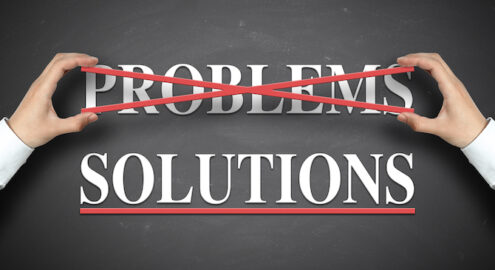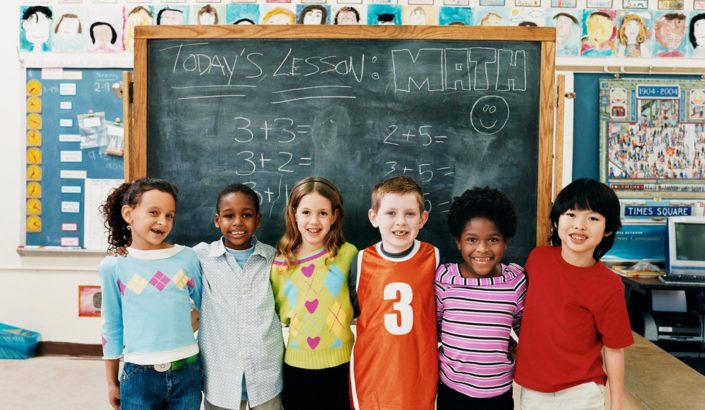What Is It?
Of all the academic subjects, math might seem to be the hardest to integrate with social, emotional, and ethical learning goals. Math is often seen as value-neutral—after all, numbers are numbers—but teaching and practicing it is actually laden with values, whether we like it or not (one of which may be the idea that math is and should be value-neutral!). Using a prosocial lens in math instruction helps us be more intentional about the values we convey, through both content and process.
In terms of content, math is used in society in ways that have real ethical consequences, and connecting content of math problems to “real world” issues can engage students more and help them see math as more important and relevant in their lives.
Instead of using word problems that are decontextualized or that always focus on consumerism and profit motives, a middle school math teacher creates algebra and geometry problems that incorporate environmental and social issues while covering the same mathematical concepts.
For instance, instead of a problem about how a store owner can maximize profit through different kinds of advertising, he asks how the director of a homeless shelter can maximize money going back into the community through different housing plans.
Instead of having students calculate the area of a circular garden and how many flowers can be planted, he asks them to find the area of the circular plume from an oil spill and how many seabirds will be affected.
As for process, what happens in math class can have lasting social, emotional, and practical implications for students; how we teach and expect students to learn can be a powerful force for or against equity.
A middle school math teacher notices that certain students always raise their hands to answer in-class questions, while others never do. To equalize class participation, she starts drawing sticks to randomly call on students.
However, she then surveys her students and finds that this makes some students feel anxious and judged. Some of them strongly prefer to give answers in writing rather than verbally, or to discuss with a group before answering. So instead, she sometimes puts students into cooperative problem-solving groups in which each student has a role and is responsible for helping each other person in the group learn.
Instead of only focusing on getting to the right answer, she promotes the value of effort and of using different strategies, and gives everyone the chance to become more comfortable with different ways of participating.
Why Is It Important?
Giving attention to the social, emotional, and ethical dimensions of mathematics can make students feel more positively towards math, promote equity in math achievement, and help students become more responsible citizens.
Math and SEL skills are strongly related.
- Math performance over time, starting in preschool, is a better predictor of high school graduation and college attendance rates than reading performance is.
- Research has shown that preschoolers’ math skills are positively related to their social-emotional competencies and negatively related to behavior problems; furthermore, early math intervention decreases behavior problems, suggesting a positive feedback loop.
- Studying math inevitably involves emotion, and when teachers take this into account and integrate SEL into math lessons, students’ math and SEL skills can enhance each other.
Math is more enjoyable and equitable when it’s (pro)social.
- When students perceive that their peers care about math, they’re more likely to enjoy math class and less likely to feel anxious, angry, or bored.
- Students who have prosocial goals in math—for example, to help their friends learn—are more likely to have positive attitudes towards math and to care about deep learning. In one study of middle school math classes engaged in cooperative learning, training students how to give and receive help raised math achievement scores particularly for Black and Latinx students, which led to more equitable outcomes overall.
Math can be empowering, and can help to make the world a better place.
- At the individual level, math achievement opens doors to higher education and career opportunities, but math class can be about more than developing math skills; it can also help students become better citizens, more able to understand the world and contribute to transforming it.
- Bringing in meaningful real world issues and applications can help with the balance of preparing students to perform well in math without erasing their identities, contexts, and emotions. Plus, the more important students perceive math to be, the more positive feelings they experience in math class, even when it’s challenging.
Caring and equitable teaching practices in math make a difference.
- Teachers have the chance to promote inclusion and equity, both in math achievement and in society at large, through how they teach math. For example, elementary students’ motivation in math is increased when teachers give positive and informative feedback, value learning for its own sake, use humor, and foster social support and collaboration.
- Equitable teaching practices in high school math can increase achievement and decrease inequities in math performance. Examples include cooperative group work in which each student has a role, explicit valuing of different ideas and contributions, and an emphasis on effort over ability. Such practices can also help cultivate a culture of respect for different perspectives, strengths, and contributions in general.
Practice Collections
Practices

4Hs of Belonging-Centered Math Instruction

Finishing Math Word Problems

Norm Co-Creation

Good Group Work in Math

Four 4s

Number Talk

Dot Card Number Talk

Mindset Boosting Messages for Math

Contemplative Writing

People Who Made a Difference

Are you ready to build a kinder, happier school where everyone belongs? Join Greater Good Educators! Explore the science of well-being in a supportive community of educators from around the world. Registration is now open for the 2025-2026 school year!



